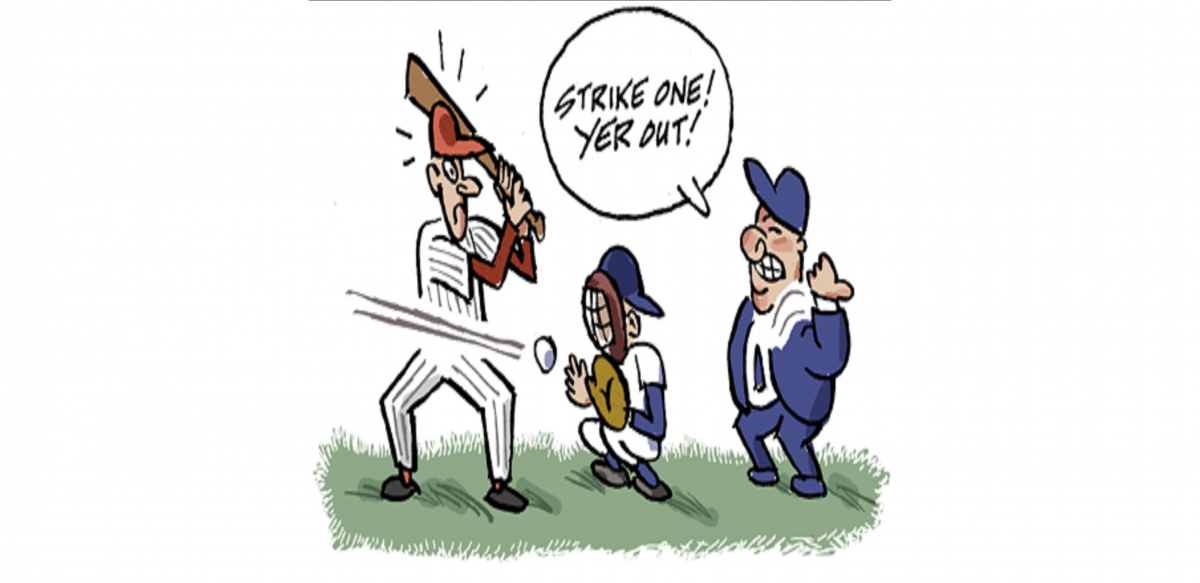Confronting Zero Tolerance

Zero tolerance policies often lead to grossly unfair punishments. Cartoon: Nick Thorkelson
Bosses are in love with zero tolerance policies. One arbitrator calls them “the last refuge of weak managers.”
Zero tolerance policies authorize employers to discharge workers who commit specified infractions without consideration of the surrounding circumstances, length of service, or the employee’s lack of prior discipline.
No Tolerance for Zero Tolerance
In a published case (Hinckley & Schmitt, 73 BNA LA 654) involving a trucking company, veteran arbitrator Stephen Goldberg reinstated a driver with back pay despite a company policy mandating discharge for two accidents in a six-month period. Both accidents were minor and the employee had nearly 10 years’ service.
The arbitrator explained:
"To the extent that the accident policy dictates the discharge of an employee involved in two chargeable accidents within a six-month period, with no consideration of the circumstances of those accidents or the prior record of the employee involved, that policy is wholly unreasonable.
"It is also inconsistent with the Collective Bargaining Agreement because that Agreement permits discharge only for just cause, while the policy requires discharge even when, as in the instant case, just cause for discharge does not exist. Because it is inconsistent with the Agreement, the accident policy, to the extent that it would require discharge in this case, is of no effect."
UNFAIR PUNISHMENT
Zero tolerance policies often lead to grossly unfair punishments.
- An employee is dismissed for fighting because she grabs the hand of a co-worker who strikes her without reason.
- A worker with an unblemished record is fired because he tests positive on a random marijuana screening.
- A driver with an outstanding safety history is terminated because she scratches her truck in a narrow enclosure.
When a union challenges a zero tolerance policy, the employer often refers to contractual language giving it the right to issue “reasonable” rules and regulations.
Zero tolerance violates the contract’s “reasonableness” requirement. When an employee whose conduct would ordinarily justify no more than a warning or suspension is discharged because of a rigid zero tolerance policy, the union should assert that the policy violates the common contractual requirement that rules must be “reasonable.” See the arbitration award cited in the box.
Zero tolerance violates the just-cause clause. Many union contracts say that rules must “not conflict with” any part of the agreement. A rule that permits or mandates discharge without consideration of the surrounding circumstances conflicts with the contract’s just-cause clause.

SUPPORT LABOR NOTES
BECOME A MONTHLY DONOR
Give $10 a month or more and get our "Fight the Boss, Build the Union" T-shirt.
The just-cause concept, as interpreted by veteran labor arbitrators, compels an employer to weigh the gravity of the offense, consider mitigating and extenuating circumstances, and apply progressive discipline. Zero tolerance policies snuff out these bargained-for protections.
Take, for example, a policy that calls for the termination of any employee involved in a fight. If an employee was simply defending herself, did not use a weapon, did not disrupt production, and did not cause injury, discharge on a first offense would violate just cause and an arbitrator could be expected to reinstate the worker.
UNION ACQUIESCENCE
A union that contends a termination pursuant to a zero tolerance policy violates the contract may have a problem if it has failed to challenge similar including the gravity of the infraction and the employee’s record.
The union should make a similar argument if the policy says an offense is “subject” to discharge or that discipline will be applied “up to and including discharge.”
CARDINAL OFFENSES
It is unfortunate, but zero tolerance policies are found in some union contracts, sometimes in a section titled “cardinal offenses.” A cardinal offense provision gives management the right to disregard just-cause principles such as the gravity of the offense, mitigating circumstances, and progressive discipline.
The union can raise defenses such as lax enforcement, disparate treatment, and due process. Still, it will be fighting with its hands tied behind its back.
CONFRONTING A NEW POLICY
Under the National Labor Relations Act, an employer must give the union advance notice and allow bargaining before adopting new disciplinary policies such as a zero tolerance rule. Even if contract language waives the union’s right to negotiate on the content of rules, the employer must still bargain on the effects of the rule.
If an employer adopts a zero tolerance policy without advance notice to the union, or if it ignores a request to bargain, the union should file an unfair labor practice charge at the National Labor Relations Board, or, in the case of public sector unions, at the appropriate state labor board.
Labor lawyer Robert M. Schwartz is the author of Just Cause: A Union Guide to Winning Discipline Cases. Buy it and other Schwartz books at labornotes.org/store.





